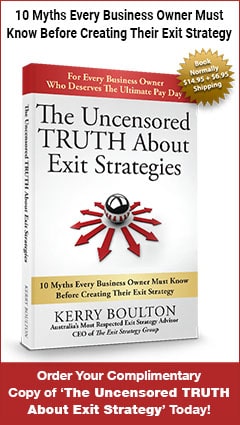Business Blueprint Interview: How to Successfully Sell Your Business for the Best Possible Price, Part 3
How Do You Value Your Business?
Now, let’s talk about the valuation of the business. If you can benchmark your business against others in your industry, that will give you a bit of a guide on how to value your business. There are quite a few tools around. I have a couple of online tools I like to use that can give you an indication.
You can usually find out what businesses sell for in a certain industry from a business broker association. If you talk to a business broker, they will be able to give you a guide. There are general rules of thumb for different industries.
But we want to go beyond that. We don’t want industry averages at all. To me, that would be always be the low-ball. That’s when you just say, “Thank you very much” or “That’s interesting. How did you arrive at that figure?”
It all comes back to thinking about who’s going to buy your business, so you can pitch it in an attractive way. To do that, you have to understand where the market is heading, who the competitors are and how you can project the future cash flows. Because that’s what people are buying. That’s what the purchaser is going to buy. They are buying the future cash flow they will be able to extract from your business to put into their own business.
Discounted cash flow calculations are not my forte. Your accountant will be able to help you out on that one. When you do your future financial projections, look at the revenue you’re going to generate and bring that back to “today’s value” based on an interest rate. That will give you some idea of what they think your business could be worth.
Couple that with what you need from a financial planning perspective and see if there’s a gap. If there is a gap, then we need to examine it more closely to find out what we can do to close the gap so it doesn’t exist.
The moment someone gets a sniff you want to sell your business they are going to say, “What do you want for it?” How do you answer that question?
The most important question you can ask in response is “Why are you interested?” because one of the really important things to do is to understand the buyer. It’s getting into their head and understanding what’s motivating the buyer. Why do they want the business?
No matter what type of sale you are making, even if it’s a family business and there’s a succession happening, you need to understand the successor. What kind of planning is going on in their minds?
Some of the questions you should consider asking them are “Why are you interested?”, “What are you going to do with the business?” and “How do you plan to grow it?”
If they answer all those questions and they’re still saying, “What’s your asking price?”, you can respond with “What do you think it might be worth?”
Between You And The Buyer, Who Should Name The Price?
In naming the price of your business, invite offers to start with. This will give you two things.
Firstly, this gives you feedback, an understanding of what the perception might be as to what people think your business is worth. This gives you an opportunity to respond and say, “Well, there’s a great business over there you might like to look at because that’s probably in your ballpark whereas our business is at a much higher level than that.” You can use some wording around that without actually giving away the price.
You will then have a next step when someone low-balls you. You can say, “Thanks, that’s interesting you should say that. What made you think that was a reasonable, fair offer?” Find out the information. You don’t even have to engage any further. You can say, “Look, that’s really terrific. I’m going to contact my business broker and if you’d like to take this further, I can introduce you.”
You can then pass the information off to the person handling the sale and they can do the proper negotiation for you.
How Do You Create Competitive Tension?
If you have been through the process of thinking about who might buy your business and, if you do market your business proactively and you invite offers, you might be surprised with the number of offers you get.
You create a mini auction, basically. You can do that, you can actually create it. You definitely need to have your broker involved. A third party must be involved in the whole negotiation process with you to make it so that you are kept at arm’s length because you do become too emotionally involved. That always happens. It doesn’t matter who you are.
The process is actually quite similar to selling your home. The emotion that’s there is incredible. It really is. Your business is your baby, just as your home is your castle.
The emotion that is driving you can often cloud your thinking. Sometimes business owners can have inflated views, but hopefully they will get past them, to be at a realistic level.
It’s the emotion that catches you. Selling a business is very difficult. Your business is your identity. You’ve been wrapped up in it. All of a sudden, ultimately when it’s gone, there’s almost a grieving process that people go through. Notwithstanding for some, it’s “Thank goodness it’s over. I’m past it.”
For most, they have often started from scratch and built it and that’s been their lives.
There’s a fascinating story about Richard Branson, when he had to sell Virgin Music to Sony. He needed the money desperately. He talks about when he is walking down the street, he has a cheque for a billion dollars in his hands and he’s crying. He is literally crying. He’s sobbing because it’s something he grew from nothing, even though he’s got this cheque for a billion dollars that he really needed. His whole identity had just been sold off.
You might experience this while you’re out socially, and someone says to you, “What are you doing now? What are you doing with yourself?”
When people do sell their businesses, and particularly when they get a very big payday, one thing I would highly recommend is take some time to decompress. That’s a really useful word, “decompress”. Because you are stressed and sometimes it takes months to get over that.
Have something to do. Have something else useful to do because a life without purpose is no life. You have to have another purpose in your life. That could be a whole range of different things. You might want to get involved in the community. I have been involved in our local community sports club for 20 years.
Those are things that you enjoy. You might want to do some volunteer work. You might want to put back into the community in different ways. You might actually want to go out and mentor and be an adviser for other people who are in their businesses.
One of the other strategies for selling your business is, to have a form of vendor finance, where you might bring in someone who is going to buy the business, and you might mentor them in your own business. This can be hard too, because you have been calling in the shots.
So, you could mentor the person who wants to buy your business. If they’re the right buyer but they don’t just have the money, you are going to say, “You are going to pay me, let’s just say it’s a $100,000 a year for the next five years, and I’ll help you in that transition.”
There is also something called a “management buy-out”. That iswhat I did when I bought the freight business from Mayne Nickless. It was a management buy-out.
You put a syndicate together. It could include staff, management and external investors as well. Basically, the business is bought from within. And it may mean you leave some money in the business like Mayne Nickless did for me, way back when. You leave some money in the business and then it’s paid to you over time.
What Terms Should We Be Looking For?
There are so many variables, but the best case scenario is “Here is the cash”, then you’re out. That is the least risk for you as the seller. But nine times out of ten that is not going to happen because a lot of the intellectual property in the business is caught up in you, the owner. Even though you may have done your best to get it all out of your head and systemised, there will be a perception from the buyer that they need you there. They need you around for a while.
That may change after two or three months, but there are different scenarios. There could be an earn-out, where a portion of your payout is tied up with the future profits of the business. “We are paying you a million dollars. Here is $500,000 now and we will pay you the rest if the business hits these goals.”
You still have skin in the game. And it could be over whatever period of time you negotiate. It could six months, two years, five years. It’s all negotiable.
Depending on the business buying you, you could get stocks, for instance. If you are being bought by a listed company, they may give you a certain amount of cash and a certain value in shares. You are counting on the value of those shares increasing or not going down. Usually the shares will be on ice for a little while and again the term is negotiable.
They might say, “Here are the shares but you can’t sell them for a year,” and that way you know you want the company to keep growing so you can increase your value as well. They still want your skin in the game.
On the other hand, sometimes people have this notion around holding on to a little bit of equity in the business. Say, for instance, you are selling to a private equity group. They have a very short time frame. With private equity usually, they see there’s a great opportunity with your business and they are going to grow it three to five times in the next three to five years before they sell it again.
That’s always the way it goes with private equity. Part of their deal might be that you will retain a small percentage.
That’s a really good outcome for you because you unlock the wealth you created so you get a cash payout. Then you are still interested and you still have a little bit of skin in the game as far as the future is concerned.
Often, however, they do not want you around though. They want you out because they are bringing in a different management style and different key people to exponentially grow the business.
It is very difficult in that type of situation. So if you are in an earn-out, it’s often very difficult when you have been the boss. You have been calling the shots. “It’s my way or the highway,” so to speak. All of a sudden, you are answering to someone else and you have to start doing management reports you are not used to doing. It’s often very difficult to be in that position.



Recent Comments